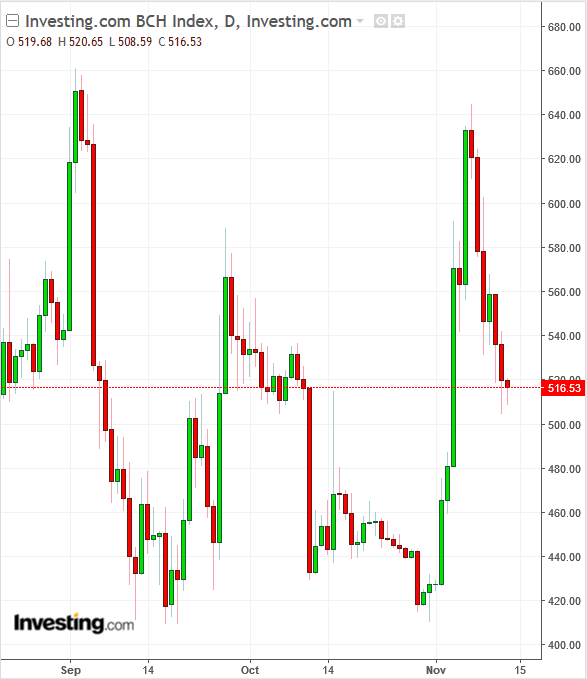The fourth largest cryptocurrency by market cap, Bitcoin Cash (BCH), is scheduled to hard fork this coming Thursday, November, 15. A hard fork is the term used when a single, blockchain-based cryptocurrency splits its protocol into two different versions, thereby creating two separate alt-currencies going forward, both of which are automatically acquired by holders of the original token at the time of the hard fork.
Bitcoin Cash is itself a token that was originally spun off via a Bitcoin hard fork in 2017. As a rule, investors tend to rush into digital tokens that announce a hard fork, ahead of the event, since it offers the potential to increasing the value of the initial investment, sometimes significantly.

However, contrary to accepted market behavior, BCH is being sold off, even as the broader asset class remains fairly steady. Down almost 17% at the time of writing, from $622 less than a week ago, Bitcoin Cash is currently trading at $517. What's driving this unexpected slump?
BCH War Zone
The upcoming hard fork is scheduled to create two new digital tokens, Bitcoin Satoshi Vision (SV) and Bitcoin ABC. Bitcoin Cash undergoes two hard fork upgrades a year notes Daniel Schwartzkopff, CEO, Invictus Capital. In the past, these have been implemented relatively smoothly and without a notable coin split. However, this time is markedly different:
“The upcoming Bitcoin Cash hard fork has proved to be highly contentious, with several cryptocurrency heavyweights voicing their strong opinions over Bitcoin Cash’s future development. The community has been divided due to nChain running their own upgrade.”
nChain, the group developing the SV token, is being led by well known cryptocurrency developer Craig Wright. The group plans to increase the block size to 128mb, though the mainstream Bitcoin Cash ecosystem doesn't necessarily favor the new SV protocol since it runs contrary to the roadmap set forth by bitcoincash.org and the developers of ABC. Amaury Sechet, the developer behind Bitcoin ABC is leading the opposition. He, along with many others, has dubbed SV the “fake Satoshi.”
The mess continues to escalate and insults across the crypto tech community are being hurled. Jihan Wu the co-founder of Bitmain tweeted:
“The whole BCH community are working together to kick Fake Satoshi out. The resisitence [sic] against cult leader proves the inner strength and sophistication of the BCH ecosystem!”
Schwarzkopff adds that the controversy has not been good for Bitcoin Cash's short term prospects:
“The price of BCH appreciated quickly in the lead-up to the hard fork. We have seen this happen often as speculators hope to benefit from the hard fork by owning the native cryptocurrency of both blockchains. However, as momentum and hype have dampened [the situation] due to investors beginning to exit their positions, we have seen a rapid decline."
Despite the conflict, Craig McGregor, co-founder and CEO of DSTOQ, believes the hard fork is a positive sign of growth and evolution for the industry.
“Hard forks often draw increased attention from new investors and fuel open discussions of what works and what does not. The role of cryptocurrency exchanges will be to disseminate and present facts in an objective way to all investors, and to ease concerns as they arise. Until the full impact of the fork reveals itself, we anticipate that both versions of Bitcoin Cash will continue to be supported by the community.”
Frank Wagner, co-founder and CEO of INVAO agrees with McGregor. He believes the upcoming hard fork in Bitcoin Cash will likely lead to many changes in the crypto market as a whole.
It's difficult to speculate on the exact effect this will have on the price of Bitcoin Cash or indeed of any other cryptocurrency, he notes. In his view, as the hard fork develops, features and adoptability will become clearer, allowing users to make more informed decisions on how to invest.
He recommends that investors interested in cryptocurrency assets, but concerned about the new technological advancement, seek guidance from seasoned professionals.
Exchange Support Could Be Key to Dual, Post-Fork Adoption
Poloniex, the cryptocurrency exchange operated by Goldman Sachs-backed startup Circle, has announced it will be the first cryptocurrency exchange to offer trading for the pending BCH hard fork, even amid the ongoing debate over the technology's roadmap. On November 12, Bitfinex, which the Blockchain Transparency Institute says is the fourth largest crypto exchange, announced it would support both camps as well.
Robert Flohr, CEO of Trino Network thinks support for both sides is probably the ultimate outcome. However, he adds:
“Miners will have a lot to say about who controls the network after the fork and it could well be a very different reaction from traders going forward. Further appreciation of BCH would depend on the level of support it will receive from a variety of top exchanges, not just Goldman's position.”
Still, says Flohr, given the current liquidity in crypto markets this split doesn't help matters, nor necessarily crypto asset class uptake. The most optimal path, adds Flohr, is for users to select one version of this technology, though he believes that's unlikely.
